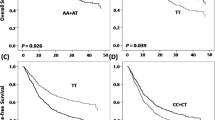Abstract
Background
This study was conducted to investigate whether polymorphisms of glucose transporter 1 (GLUT1) gene are associated with the prognosis of patients with non-small cell lung cancer (NSCLC) after surgical resection.
Methods
Five single nucleotide polymorphisms (SNPs) in GLUT1 were investigated in a total of 354 patients with NSCLC who underwent curative surgery. The association of the SNPs with patients’ survival was analyzed.
Results
Among the five SNPs investigated, two SNPs (GLUT1 rs3820589T > A and rs4658G > C) were significantly associated with OS in multivariate analyses. GLUT1 rs3820589T > A was associated with significantly better OS (adjusted hazard ratio [aHR] = 0.57, 95% confidence interval [CI] = 0.34–0.94, P = 0.03, under dominant model), and rs4658G > C was associated with significantly worse OS (aHR = 1.91, 95% CI = 1.09–3.33, P = 0.02, under recessive model). In the stratified analysis by tumor histology, the effect of these SNPs on OS was only significant in squamous cell carcinoma but not in adenocarcinoma. When the two SNPs were combined, OS decreased as the number of bad genotypes increased (Ptrend = 4 × 10−3).
Conclusions
This study suggests that genetic variation in GLUT1 may be useful in predicting survival of patients with early stage NSCLC.

Similar content being viewed by others
References
Hanahan D, Weinberg RA. Hallmarks of cancer: the next generation. Cell. 2011;144:646–74.
Hsu PP, Sabatini DM. Cancer cell metabolism: Warburg and beyond. Cell. 2008;134:703–7.
DeBerardinis RJ, Lum JJ, Hatzivassiliou G, et al. The biology of cancer: metabolic reprogramming fuels cell growth and proliferation. Cell Metab. 2008;7:11–20.
Riganti C, Gazzano E, Polimeni M, et al. The pentose phosphate pathway: an antioxidant defense and a crossroad in tumor cell fate. Free Rad Biol Med. 2012;53:421–36.
Yeung SJ, Pan J, Lee MH. Roles of p53, MYC and HIF-1 in regulating glycolysis—the seventh hallmark of cancer. Cell Mol Life Sci. 2008;65:3981–99.
Krzeslak A, Wojcik-Krowiranda K, Forma E, et al. Expression of GLUT1 and GLUT3 glucose transporters in endometrial and breast cancers. Pathol Oncol Res. 2012;18:721–8.
Wachi S, Yoneda K, Wu R. Interactome-transcriptome analysis reveals the high centrality of genes differentially expressed in lung cancer tissues. Bioinformatics. 2005; 21:4205–8.
Amann T, Maegdefrau U, Hartmann A, et al. GLUT1 expression is increased in hepatocellular carcinoma and promotes tumorigenesis. Am J Pathol. 2009;174:1544–52.
Kawamura T, Kusakabe T, Sugino T, et al. Expression of glucose transporter-1 in human gastric carcinoma: association with tumor aggressiveness, metastasis, and patient survival. Cancer. 2001;92:634–41.
Sawayama H, Ishimoto T, Watanabe M, et al. High expression of glucose transporter 1 on primary lesions of esophageal squamous cell carcinoma is associated with hematogenous recurrence. Ann Surg Oncol. 2014;21:1756–62.
Ooi AT, Gower AC, Zhang KX, et al. Molecular profiling of premalignant lesions in lung squamous cell carcinomas identifies mechanisms involved in stepwise carcinogenesis. Cancer Prev Res. 2014;7:487–95.
Osugi J, Yamaura T, Muto S, et al. Prognostic impact of the combination of glucose transporter 1 and ATP citrate lyase in node-negative patients with non-small lung cancer. Lung Cancer. 2015;88:310–8.
Chen B, Tang H, Liu X, et al. miR-22 as a prognostic factor targets glucose transporter protein type 1 in breast cancer. Cancer Lett. 2015;356:410–7.
Tohma T, Okazumi S, Makino H, et al. Overexpression of glucose transporter 1 in esophageal squamous cell carcinomas: a marker for poor prognosis. Dis Esophagus. 2005;18:185–9.
Goos JA, de Cuba EM, Coupe VM, et al. Glucose transporter 1 (SLC2A1) and vascular endothelial growth factor A (VEGFA) predict survival after resection of colorectal cancer liver metastasis. Ann Surg. 2016;263:138–45.
Kunkel M, Reichert TE, Benz P, et al. Overexpression of Glut-1 and increased glucose metabolism in tumors are associated with a poor prognosis in patients with oral squamous cell carcinoma. Cancer. 2003;97:1015–24.
Starska K, Forma E, Jozwiak P, et al. Gene and protein expression of glucose transporter 1 and glucose transporter 3 in human laryngeal cancer-the relationship with regulatory hypoxia-inducible factor-1alpha expression, tumor invasiveness, and patient prognosis. Tumour Biol. 2015;36:2309–21.
Shen YM, Arbman G, Olsson B, et al. Overexpression of GLUT1 in colorectal cancer is independently associated with poor prognosis. Int J Biol Markers. 2011;26:166–72.
Siegel RL, Miller KD, Jemal A. Cancer statistics, 2016. CA Cancer J Clin. 2016;66:7–30.
Detterbeck FC, Boffa DJ, Tanoue LT. The new lung cancer staging system. Chest. 2009;136:260–71.
Lee SY, Jin CC, Choi JE, et al. Genetic polymorphisms in glycolytic pathway are associated with the prognosis of patients with early stage non-small cell lung cancer. Sci Rep. 2016;6:35603.
Meijer TW, Schuurbiers OC, Kaanders JH, et al. Differences in metabolism between adeno- and squamous cell non-small cell lung carcinomas: spatial distribution and prognostic value of GLUT1 and MCT4. Lung Cancer. 2012;76:316–23.
Schuurbiers OC, Meijer TW, Kaanders JH, et al. Glucose metabolism in NSCLC is histology-specific and diverges the prognostic potential of 18FDG-PET for adenocarcinoma and squamous cell carcinoma. J Thorac Oncol. 2014;9:1485–93.
Goodwin J, Neugent ML, Lee SY, et al. The distinct metabolic phenotype of lung squamous cell carcinoma defines selective vulnerability to glycolytic inhibition. Nature Commun. 2017;8:15503.
Acknowledgment
This study was supported in part by the National R&D Program for Cancer Control, Ministry of Health and Welfare, Republic of Korea (1720040), and in part by Basic Science Research Program through the National Research Foundation of Korea (NRF) funded by the Ministry of Science, ICT & Future Planning (NRF-2016R1A1A1A05005315).
Disclosure
The authors declared that they have no conflict of interest.
Author information
Authors and Affiliations
Corresponding authors
Electronic supplementary material
Below is the link to the electronic supplementary material.
Rights and permissions
About this article
Cite this article
Do, S.K., Jeong, J.Y., Lee, S.Y. et al. Glucose Transporter 1 Gene Variants Predict the Prognosis of Patients with Early-Stage Non-small Cell Lung Cancer. Ann Surg Oncol 25, 3396–3403 (2018). https://doi.org/10.1245/s10434-018-6677-1
Received:
Published:
Issue Date:
DOI: https://doi.org/10.1245/s10434-018-6677-1




